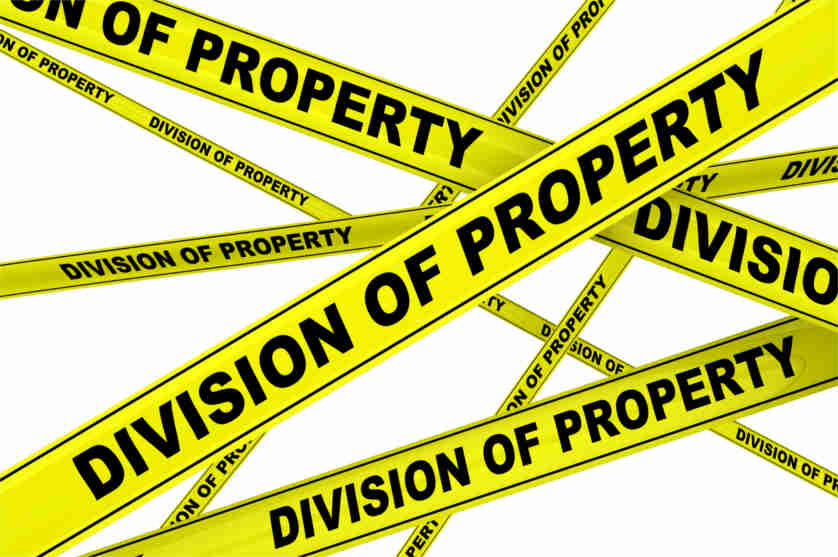Unequal Division of Property in a Divorce in Arizona

Table of Contents
You may want to know if there is ever an unequal division of property in a divorce in Arizona. When a marriage ends in divorce in Arizona, the couple’s community property is usually divided equally between them.
However, in rare cases, a superior court judge can decide that an even split this is not a fair division and that some items of community property should be awarded to one spouse.
In the case of In Re Marriage of Flower, 225 P.3d 588 (Ariz. Ct. App. 2010) the Arizona Court of Appeals discussed when a divorce court could divide community property equitably instead of equally.
Judy and Norman Flower married in 2006 when she was 55, and he was 76.
Just over a year later, he asked the court to annul the marriage, claiming that she never loved him romantically but was only interested in obtaining his property. She sued for divorce.
During the brief marriage, Norman transferred his residence, the “Sugar Creek” house, to both of them as community property, then took out a line of credit in that house to make improvements to Judy’s separate residence, the “Queen Valley” house, where the two of them planned to live.
Judy did not transfer her home to community property.
Norman asked the divorce court to give him back the Sugar Creek home rather than dividing it between the spouses.
The court did give Norman the Sugar Creek house but also held him liable for part of the loan taken to fix up Judy’s house. Judy appealed.

The Sugar Creek House Was a Gift by Norman to Marriage
Judy argued that the superior court was wrong in giving the Sugar Creek home to Norman.
The general rule in Arizona is that this type of property transfer – from separate property to community property – constitutes a gift to the other spouse.
A spouse arguing that a transfer was not a gift must prove that he did not intend it to be a gift when he made the transfer, a showing Norman was not able to make.
Therefore, Judy argued, the superior court had to divide the Sugar Creek house equally.
However, the Court of Appeals rejected her argument. Had Norman proved that he didn’t intend to make a gift, the house would be his separate property.
However, the Court noted that sometimes community property could be distributed equitably, rather than equally.
Superior Courts Have Authority to Divide Community Property Equitably
In Arizona, community property implies equal ownership, so in most cases, it is fair to divide jointly held property equally.
However, the Court of Appeals said, under the Arizona Supreme Court decision in Toth v. Toth, an equal division is not always equitable.
The Court noted that determining what “equitable” is depends on the facts of a particular case.
Under Toth v. Toth, an Arizona divorce court has broad authority to decide which spouse gets specific community assets and debts in some cases.
Marriage Length Is Just One Factor to Consider
Judy argues that because her marriage lasted 13 months – over one year – the Toth v. Toth ruling allowing an equitable rather than an equal division does not apply.
But the Court of Appeals said that marriage length was just one factor a superior court could look at to make the determination.
The Lower Court Reviewed Appropriate Factors in Unequal Division of Property

The Court of Appeals noted that the superior court in charge of the Flower divorce considered relevant factors in determining who should get the Sugar Creek house.
First, the superior court looked to the source of funds used to acquire the community property home and the contributions made by each spouse toward the improvement of it.
Usually, community property is money earned during the marriage by both spouses, and community property real estate is purchased with money earned during the marriage.
In this case, Norman bought the house with his separate funds before the marriage, and Judy did not contribute money or labor toward fixing it up at all.
The property did not benefit from the marriage at all, and in fact, its value diminished because the loan was taken out on it that was used to fix up Judy’s separate property.
The superior court also considered the improvements made to Judy’s separate residence by the couple.
Most of the $60,000 of improvements came from a home equity loan on the Sugar Hill house.
When community funds are expended to improve the separate property of one spouse, the community has a claim for reimbursement of that money.
An equal division of these debts would result in both Judy and Normal ending up with on one-half of the total debt and each being awarded one-half of the value of the improvements made.
But the Court of Appeal said an equal division was not required.
The superior court allocated about $42,000 of the debt the couple incurred to fix up Judy’s house to Norman, the other $16,000 to Judy.
It also awarded the value of the improvements to Judy.
In making the overall division of community property, the Court of Appeals found, the superior court balanced the equities of the situation.
The Court declined to second-guess the court and affirmed its decision.
Unique Circumstances Justifying an Unequal Division of Property in the Toth vs. Toth Case
It is important to understand the apportionment of assets ordered by a judge in an unequal division of community property in an Arizona divorce. The Court of Appeals of Arizona granted a review of Anthony Toth, Petitioner-Appellee, v. Gloria Snyder Toth, Respondent-Appellant to consider whether an equitable distribution of marital assets would require that each party, in this case, receive an equal distribution.
It was concluded that this case does not require an equal distribution of assets to provide the parties with an equitable distribution of community assets. The court also holds that joint tenancy property should be treated similarly to community property under Arizona law (A.R.S. § 25-318(A).
One year after meeting at a senior citizens dance in Mesa, Arizona in 1992, Anthony Toth and Gloria Snyder Toth were married (Anthony, age 87 and Gloria, age 66). The day after the wedding, Anthony withdrew $140,000 from his own sole and separate funds in order to purchase a home and placed it in joint tenancy with his new wife with the right of survivorship.
Less than a month later, on January 10, 1994, Anthony filed for an annulment. The final decree of dissolution was entered on September 19, 1995, with the house being the only marital property that needed to be divided. The court awarded $15,000 to Gloria Snyder Toth with the remainder being awarded to Anthony Toth.
In response to the court’s decision, Gloria appealed. The Court of Appeals of Arizona reviewed the case and decided Arizona law pertaining to this issue requires that joint property requires a substantially equal division unless provided with a sound reason to prevent such distribution.
Sound reason being limited to certain statutory factors: excessive/abnormal expenditures, fraud, concealment or destruction. The court of appeals came to the decision that the trial court had abused discretion by ordering an unequal division of the joint tenancy property. The decision was reversed.
Equitable Versus Unequal Division of Community Property in Arizona

The dissenting opinion of Judge Kleinschmidt was that there was a broader meaning of “equitable” in comparison to what the majority was assigned to the term. As he believed that an important issue of Arizona law was decided incorrectly, Anthony’s petition for review was granted. Gloria believes that the law entitles her to 50% of the house purchased the day after her marriage to Anthony Toth. She states that the “gifted property” is her sole and separate property.
Under the Arizona statute, two types of property are treated alike for dissolution purposes (even though they are different): joint tenancy property and community property. Thus the court should provide an equitable division of all such property. On this premise, the court rejected Gloria’s argument for her share of the joint tenancy property to be treated as her separate property upon dissolution of the marriage.
As a “gift” from her former husband, Gloria argues that her share of the property should be considered irrevocable according to the law of gifts, i.e. if one spouse purchases property with separate funds and places it in joint tenancy, a presumption of gift exists. The presumption of the gift means that it is presumed that the actions indicate that the spouse making the purchase intended to provide a gift to the spouse with the gift being one-half of the property.
While this is true, it is also true that gifts of joint tenancy are not irrevocable. The gift of joint tenancy, such as occurred in this case, is made in expectation of a permanent relationship. If the relationship ends prematurely, the joint tenancy is completely subject to equitable division according to the Arizona statute.
In this instance, the “gift” to the non-purchasing spouse is an equitable right in the property – not an irrevocable gifted interest in one-half of the property. According to Arizona state statute, all marital joint tenancy property is to be divided equitably whether it is “gifted” or not.
Equitable Division of Joint Versus Community Property in Arizona

Gloria argues that the Arizona state statute requires that joint tenancy property receive an equitable division unless there are exceptional circumstances to consider. She further argues that any exceptional circumstances must be in relation to the property rather than to each other in order to prevent the upholding of the statute’s requirement for equitable division.
She insists that considering the duration of the marriage in relation to an equitable division to be an inquiry into fault which is prohibited by Arizona state law. The court disagrees.
Firstly, the court interprets the statute to mean equitable, not equal with the court determining what is equitable on a case by case basis. The court also found that the statute pertaining to this case does not limit “exceptional circumstances” to those in direct relation to the property, but to the case itself.
Thus the length of the marriage is to be considered in determining an “equitable” division. It was found that in case, the meaning of equitable was something other than equal.
The last argument presented by Gloria was that the court based their decision, in whole or in part, on the determination of fault which is prohibited by law. Her claim was based on the fact that the trial court was presenting a finding when they stated that she had not made what they saw as a “good faith effort to create a viable marriage.”
The memorandum decision of the court of appeals was vacated. The case was remanded to the superior court in order to obtain additional consideration due to the opinion and evidence provided by the dissenting judge: the court may offer parties equitable division of property rather than an equal division of property and the source of funds can be considered when making the decision.
The court should consider available equitable factors that may affect the outcome, but should still not consider the fault of either party. After reconsideration of the details of the case in relation to Arizona state law, the court may affirm its prior allocation so long as it is determined that fault played no role in the original determination by the court.
If you need information about unequal division of property in a divorce in Arizona, you should seriously consider contacting the attorneys at Hildebrand Law, PC. Our Arizona community property attorneys have decades of combined experience successfully representing clients in divorce cases in Arizona.
Our family law firm has earned numerous awards such as US News and World Reports Best Arizona Family Law Firm, US News and World Report Best Divorce Attorneys, “Best of the Valley” by Arizona Foothills readers, and “Best Arizona Divorce Law Firms” by North Scottsdale Magazine.
Call us today at (480)305-8300 or reach out to us through our appointment scheduling form to schedule your personalized consultation and turn your Arizona community property case around today.

Other Articles About Community Property in Arizona
- ARIZONA COMMUNITY PROPERTY LAWS
- VALUING GOODWILL OF A LAWFIRM IN AN ARIZONA DIVORCE
- COMMUNITY PROPERTY AND ANNULMENT OF MARRIAGE IN ARIZONA
- SOLE AND SEPARATE FUNDS USED TO BUY A HOUSE IN ARIZONA
- DIVISION OF MILITARY RETIREMENT AND DISABILITY PAYMENTS IN AN ARIZONA DIVORCE
- SEPARATE PROPERTY CONTRIBUTIONS WHEN DIVIDING COMMUNITY PROPERTY IN ARIZONA
- PROPERTY HELD AS JOINT TENANTS WITH RIGHTS OF SURVIVORSHIP IN AN ARIZONA DIVORCE
- DIVIDING RETIREMENT ACCOUNTS IN AN ARIZONA DIVORCE
- ARIZONA DIVORCE DEBT
- EFFECT OF PLACING COMMUNITY PROPERTY INTO A FAMILY TRUST IN ARIZONA
- COMMUNITY PROPERTY LOTTERY WINNINGS IN ARIZONA
- IS SEPARATE PROPERTY LIABLE FOR COMMUNITY DEBT IN ARIZONA
- CREDITOR COLLECTING A SEPARATE DEBT WITH COMMUNITY PROPERTY IN ARIZONA
- TITLE AFFECTS COMMUNITY PROPERTY RIGHTS IN ARIZONA
- COMMINGLING SEPARATE PROPERTY WITH COMMUNITY PROPERTY IN ARIZONA
- ARE MILITARY RETIREMENT PAYMENTS COMMUNITY PROPERTY IN ARIZONA
- EFFORT DOES NOT ENTITLE A SPOUSE TO MORE COMMUNITY PROPERTY IN ARIZONA
- RESULT OF COMMINGLING COMMUNITY AND SEPARATE PROPERTY IN ARIZONA
- INCREASED VALUE OF A BUSINESS IN AN ARIZONA DIVORCE
- GIFT OF SEPARATE PROPERTY THROUGH A JOINT TENANCY DEED IN ARIZONA
- ABANDONMENT OF MARRIAGE AND COMMUNITY PROPERTY RIGHTS IN ARIZONA
- ARE PROFITS FROM A SEPARATE BUSINESS COMMUNITY OR SEPARATE PROPERTY
- TRACING SEPARATE PROPERTY COMMINGLED WITH COMMUNITY PROPERTY IN ARIZONA
- INTENTION CONTROLS TRANSMUTATION OF SEPARATE INTO COMMUNITY PROPERTY
- RECORDING A HOME IS INSUFFICIENT TO CHANGE SEPARATE PROPERTY INTO COMMUNITY PROPERTY
- COMMUNITY PROPERTY INTEREST IN A BUSINESS OWNED PRIOR TO MARRIAGE
- WHAT IS SEPARATE PROPERTY IN ARIZONA
- VALUATION AND DISTRIBUTION OPTIONS FOR A PENSION IN AN ARIZONA DIVORCE
- UNFAIR SEPARATION AGREEMENT IN ARIZONA
- SEPARATE PROPERTY USED PURCHASE A HOME DURING MARRIAGE IN ARIZONA
- REIMBURSEMENT FOR PAYING SEPARATE DEBTS OF A SPOUSE IN ARIZONA
- REFUSAL TO SELL A HOUSE AFTER A DIVORCE IN ARIZONA
- PENSIONS AND DIVORCE IN ARIZONA
- MILITARY RETIREMENT PAY AND DIVORCE IN ARIZONA
- IS SEPARATE PROPERTY DIVIDED DIFFERENTLY THAN COMMUNITY PROPERTY IN ARIZONA
- IS ARIZONA A 50-50 STATE IN A DIVORCE
- IS ALL PROPERTY OWNED BY EITHER SPOUSE COMMUNITY PROPERTY IN ARIZONA
- INTEREST ON A LOAN BETWEEN SPOUSES IN ARIZONA
- IMPACT OF IMPROVEMENTS TO SEPARATE PROPERTY IN AN ARIZONA DIVORCE
- HOW TO ENFORCE DIVISION OF PROPERTY AND DEBT IN ARIZONA
- HOW TO DIVIDE PROPERTY IN ARIZONA WHEN A SPOUSE IS HIDING ASSETS
- HOW STOCK OPTIONS ARE DIVIDED IN AN ARIZONA DIVORCE
- HOW IS COMMUNITY PROPERTY DIVIDED IN ARIZONA
- HOW ARE RETIREMENT ACCOUNTS DIVIDED IN AN ARIZONA DIVORCE
- FILING A LIS PENDENS IN A DIVORCE IN ARIZONA
- FAIR COMPENSATION DEFENSE IN AN ARIZONA DIVORCE
- ENFORCE A PROPERTY SETTLEMENT AGREEMENT IN ARIZONA
- DO RULES REGARDING PROPERTY APPLY TO DEBTS IN ARIZONA
- DIVISION OF DEBT IN AN ARIZONA DIVORCE
- DIVIDING PROPERTY NOT INCLUDED IN A DIVORCE DECREE IN ARIZONA
- DIFFERENCE IN COMMUNITY AND SEPARATE PROPERTY IN ARIZONA
- DETERMINING COMMUNITY VERSUS SOLE PROPERTY IN ARIZONA
- CREATION OF A COMMUNITY LIEN ON SOLE AND SEPARATE PROPERTY IN ARIZONA
- COMMUNITY PROPERTY LAWS ABOUT A SPOUSE’S PERSONAL GUARANTEE IN ARIZONA
- CHOOSING A VALUATION DATE WHEN DIVIDING ASSETS IN A DIVORCE IN ARIZONA
- CAN A SPOUSE BE HELD LIABLE FOR CREDIT CARD DEBT IN ARIZONA
- CALCULATING A COMMUNITY LIEN ON A DEPRECIATING ASSET IN ARIZONA
- EFFECT OF A DISCLAIMER DEED OR QUIT CLAIM DEED IN A DIVORCE IN ARIZONA
- CALCULATING A COMMUNITY LIEN ON AN APPRECIATING ASSET IN AN ARIZONA DIVORCE
- BANK ACCOUNTS AND DIVORCE IN ARIZONA
- DIVIDING PAID TIME OFF IN A DIVORCE IN ARIZONA
- EQUALIZATION PAYMENTS IN AN ARIZONA DIVORCE
- OMITTED ASSETS IN AN ARIZONA DIVORCE DECREE
- CRSC PAY AND DIVORCE IN ARIZONA
- JUDGMENT FOR SEPARATE PROPERTY STOLEN DURING MARRIAGE
- JUDGE IGNORES A BUSINESS APPRAISAL IN AN ARIZONA DIVORCE
- REIMBURSEMENT OF SEPARATE PROPERTY IN A DIVORCE IN ARIZONA
- SEPARATE PROPERTY INCREASES IN VALUE DURING MARRIAGE IN ARIZONA
- PERSONAL INJURY AWARDS AND DIVORCE IN ARIZONA
- VALUING A BUSINESS IN A DIVORCE IN ARIZONA WITHOUT FINANCIAL DOCUMENTATION
- RETIREMENT INCREASE AFTER DIVORCE IN ARIZONA
- FAILURE TO DISCLOSE FINANCIAL INFORMATION IN A DIVORCE IN ARIZONA
- UNAUTHORIZED USE OF A POWER OF ATTORNEY TO DISPOSE OF SPOUSE’S SEPARATE PROPERTY
- FINANCIAL AGREEMENTS BETWEEN UNMARRIED COUPLES IN ARIZONA
- WHEN A CREDITOR MAY TAKE SOLE AND SEPARATE ASSETS OF A SPOUSE
- LIABILITY FOR A SPOUSE’S NEGLIGENCE IN ARIZONA
- VALUATION OF STOCK HOLDINGS AND DEBT IN AN ARIZONA DIVORCE
- LOANS BEFORE MARRIAGE IN ARIZONA
- CREDITOR LIEN ON JOINT TENANCY PROPERTY IN AN ARIZONA DIVORCE
- INCREASE IN VALUE OF A SEPARATE PROPERTY BUSINESS STOCK IN AN ARIZONA DIVORCE
- STATEMENTS REGARDING PROPERTY ARE BINDING IN AN ARIZONA DIVORCE
- DEBTS NOT INCLUDED IN A DIVORCE DECREE IN ARIZONA
- FRAUDULENT QUIT CLAIM DEED IS INEFFECTIVE IN AN ARIZONA DIVORCE
- DISPOSITION OF COMMUNITY PROPERTY IN A LAST WILL AND TESTAMENT
- DIVIDING BUSINESS PROFITS DURING A DIVORCE IN ARIZONA
- MINORITY DISCOUNT IN A BUSINESS VALUATION IN AN ARIZONA DIVORCE
- HOW A BUSINESS IS DIVIDED IN A DIVORCE IN ARIZONA
- DIVISION OF CIVIL SERVICE RETIREMENT SYSTEM BENEFITS IN A DIVORCE IN ARIZONA
- DISABILITY PAY AND COMMUNITY PROPERTY IN ARIZONA
- VALUATION OF A PROFESSIONAL PRACTICE IN A DIVORCE IN ARIZONA
- JOINING A THIRD PARTY IN A DIVORCE IN ARIZONA
- CONTESTING A RULE 69 AGREEMENT WITHOUT A TRIAL IN ARIZONA
- DEFENSE TO REIMBURSEMENT FOR PAYMENT OF COMMUNITY BILLS IN AN ARIZONA DIVORCE
- SURVIVOR ELECTION AND MILITARY RETIREMENT IN AN ARIZONA DIVORCE
- DEFERRED MILITARY RETIREMENT IN AN ARIZONA DIVORCE
- DIVISION OF DEFERRED RETIREMENT OPTION PLANS IN AN ARIZONA DIVORCE
- CLAIMS OF WASTE IN AN ARIZONA DIVORCE
- DIVIDING ACCOUNTS RECEIVABLE IN A DIVORCE IN ARIZONA
- MINORITY DISCOUNT BUSINESS APPRAISAL IN AN ARIZONA DIVORCE
- FINDING A REALTOR DURING A DIVORCE IN ARIZONA
- WHAT TO DO IF YOUR SPOUSE IS HIDING ASSETS IN A DIVORCE IN ARIZONA
- TYPES OF BUSINESS APPRAISALS IN AN ARIZONA DIVORCE
- BENEFICIARY DESIGNATIONS AFTER DIVORCE IN ARIZONA
- RETIREMENT ACCOUNTS, QDROs, AND DIVORCE IN ARIZONA
- DIVORCE AND REFINANCING A MORTGAGE IN ARIZONA
- PROVING PROPERTY IS SOLE AND SEPARATE IN AN ARIZONA DIVORCE
- 7 REASONS YOU MAY HAVE TO SHARE YOUR INJURY SETTLEMENT IN AN ARIZONA DIVORCE
- PERSONAL INJURY SETTLEMENT IN A DIVORCE IN ARIZONA
- CLAIM OF A SPOUSE’S PERSONAL INJURY AWARD IN AN ARIZONA DIVORCE
- PERSONAL INJURY AWARDS AND DIVORCE SETTLEMENTS IN ARIZONA
- DIVORCE AND PERSONAL INJURY AWARDS IN ARIZONA
- ENFORCING A SURVIVOR BENEFIT ELECTION IN A PENSION IN ARIZONA
- MURDERER SPOUSE AND COMMUNITY PROPERTY IN ARIZONA
- DAMAGES CAUSED BY A COMMUNITY PROPERTY VEHICLE IN ARIZONA
- COMPENSATION FOR WASTE OF COMMUNITY ASSETS IN ARIZONA
- USING SEPARATE FUNDS TO BUY JOINT PROPERTY IN ARIZONA
- TRANSMUTING SEPARATE PROPERTY INTO COMMUNITY PROPERTY BY COMMINGLING
- LIABILITY FOR DEBT GUARANTEED BY THE OTHER SPOUSE IN ARIZONA
- USING COMMUNITY FUNDS TO PAY A MORTGAGE ON A SPOUSE’S SOLE AND SEPARATE HOUSE
- DISCLAIMER DEED AND DIVORCE IN ARIZONA
- COMMUNITY LIEN ON A SOLE AND SEPARATE BUSINESS IN A DIVORCE IN ARIZONA
- YOU’RE GETTING A DIVORCE, ARE YOU SURE YOU WANT THE HOUSE?
- CHANGING JOINT PROPERTY TO COMMUNITY PROPERTY IN ARIZONA
- SEGREGATING SEPARATE PROPERTY FROM COMMUNITY PROPERTY IN ARIZONA
- ARIZONA COMMUNITY PROPERTY LAWS FREQUENTLY ASKED QUESTIONS
